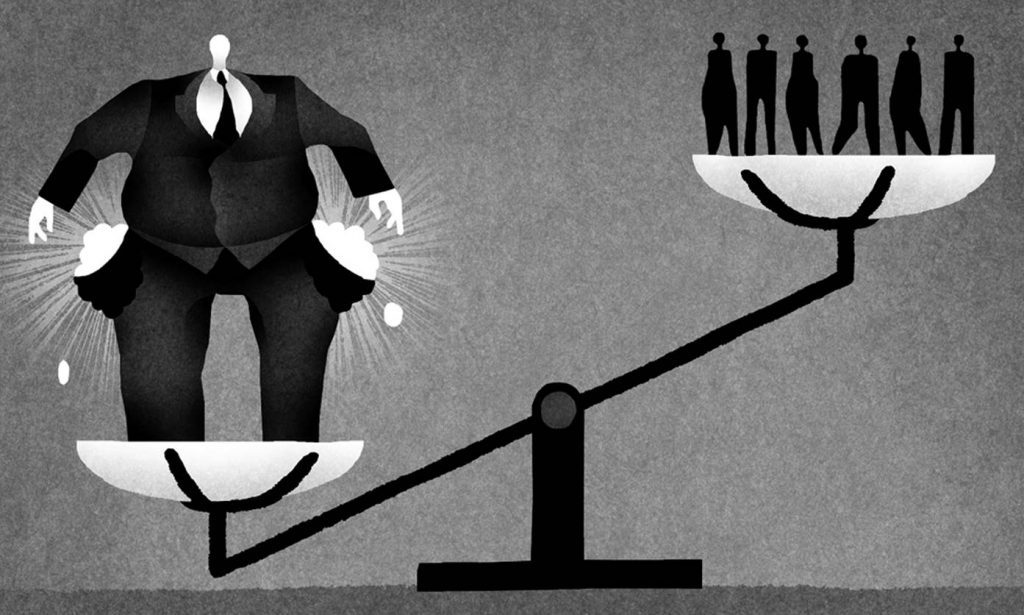Recently, Oxfam International presented its annual global inequality report titled “Inequality Kills which presented the quantum growth in wealth of a minuscule few, and the simultaneous impoverishment of millions of working people. The findings of the report remain dismal for India as well.
Inequality can be corrected by a rights-based policy framework to be followed by the Indian state to protect the poor and the marginalized.
One of the most important places to show commitment to equity is the Union Budget. Inequality should perhaps be discussed in India before and after every Union and State Budget.
India’s Inequality

- Constitutional Provisions to Address Inequality: In India, Articles 38 and 39 of the Directive Principles of State Policy (DPSP) prescribe a policy approach to address inequality.
- Article 38(1): “The State should try to promote the welfare of the people by establishing and safeguarding a social order in which justice, social, economic, and political, influence all institutions of national life as effectively as it may.”
- Section 39 (c): The State should, in particular, direct its policies toward ensuring that the economic system’s operation does not result in the concentration of wealth and means of production to the disadvantage of the general public.
Oxfam’s India-specific findings are as follows:
- Wealth Inequality: According to the report, more than half of the world’s new poor are from India, 84 percent of Indian households have lost income, and 4.6 crore people have fallen into extreme poverty during the Covid-19 pandemic.
- During this time, the richest 142 people have more than doubled their wealth to more than 53 lakh crore.
- Decline in Social Security Expenditure: As Covid continued to wreak havoc on India, the country’s healthcare budget fell by 10% from RE (Revised Estimates) 2020-21.
- Increasing Fiscal Deficit: The financial allotment for social security programmes was reduced from 1.5 percent to 0.6 percent of the entire Union budget.
Factors of Inequality:

Oxfam’s India-specific findings include:
- Budgetary Decline: Budgetary India is one of the only nations in the world where the health budget has decreased during the Covid epidemic — and by a massive 10% in 2021.
- Social security spending has decreased from 1.5 percent of the Union Budget in 2020-21 to 0.6 percent in 2021-22.
- It is at the low end of Budget allocations that individuals are denied the most basic services and entitlements, leaving them unable to subsist.
- Allocations were fixed and budgets were lowered in Budget 2021-22, despite increased allocations in the first phase of the epidemic.
- Inequality in Salaries and Allowances: For over 15 years, social security pensions for the aged, crippled, and widows have been locked at $200-300 per month.
- The rise for one crore central government workers and pensioners has cost the exchequer more than the overall social security pension budget for 3.3 crore beneficiaries, despite the fact that policymakers’ wages and pensions have been increased.
- Unavailability of Subsidized Foodgrain: Under the National Food Security Act (NFSA), the priority list of families has been frozen in absolute numbers, based on a percentage established from the 2011 Census.
- As a result, roughly 12 percent of legally qualified persons — including children of established “priority households” — have been denied access to subsidised foodgrain in the previous 11 years.
- Unequal Educational Access: The epidemic has also resulted in a generation of youngsters who are unaware of what formal schooling entails. Many teens from low-income families have already started working.
- The education budget has been slashed by 6% throughout this time period. The institutionalisation of chronic multidimensional poverty is achieved by relying on online instruction in conjunction with budget cuts.
The Next Steps:

- Multi-Pronged Approach to Combating Inequality: Programs like the National Food Security Act must be given the resources they require. Furthermore, the People’s Action for Employment Guarantee (PAEG) estimates that around 2,64,000 crore will be required to provide 100 days of work for already active job cards.
- Social security retirees must be safeguarded against hunger, illness, and poverty. The election season provides a chance to fight for the unorganised and vulnerable people’s basic rights.
- Gains from Taxation: During this epidemic, all governments should quickly tax the gains gained by the super-rich.
- Jan Sarokar, a network of over 30 social sector movements, has proposed that a 2% wealth tax and a 33% inheritance tax on the richest 1% of our population will provide an estimated Rs. 11 lakh crore per year to fund basic social sector entitlements.
- Increasing Access to Basic Needs: Given India’s rising inequality, the route that public policy should now follow is clear: health and education must be distributed considerably more equitably among the people.
- By assuring universal access to publicly funded, high-quality services like as public health and education, social security benefits, and job-guarantee programmes.
- Job Creation: India’s labor-intensive industrial sector has the capacity to absorb millions of people who are abandoning agriculture, whilst the service industry benefits the urban middle class.
- According to the International Labor Organization (ILO), a minimum wage floor should be set in a way that balances employees’ and their families’ needs with larger economic concerns.
